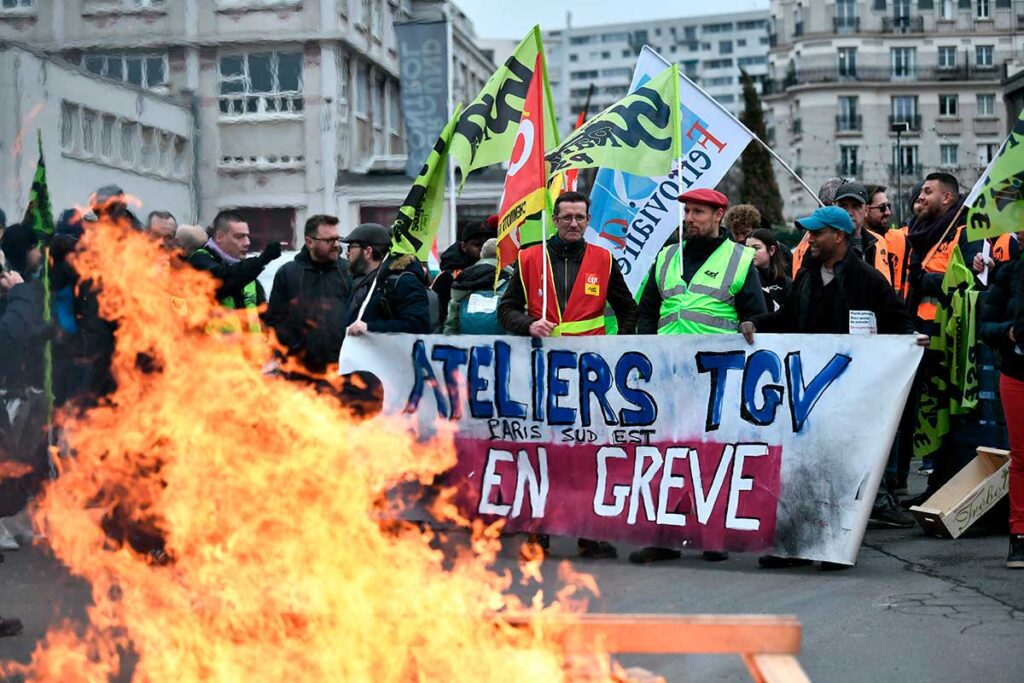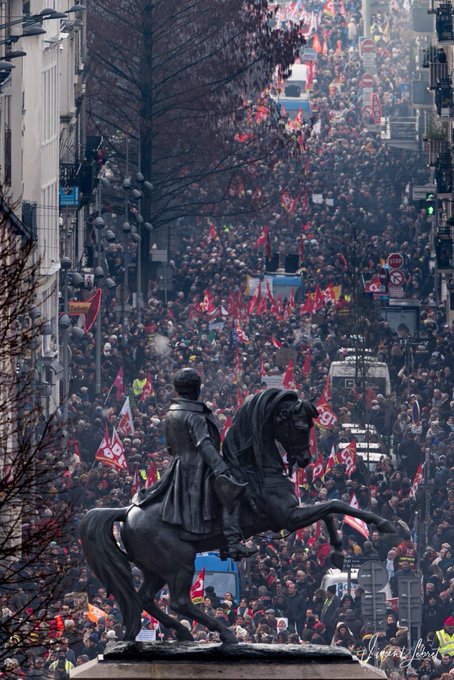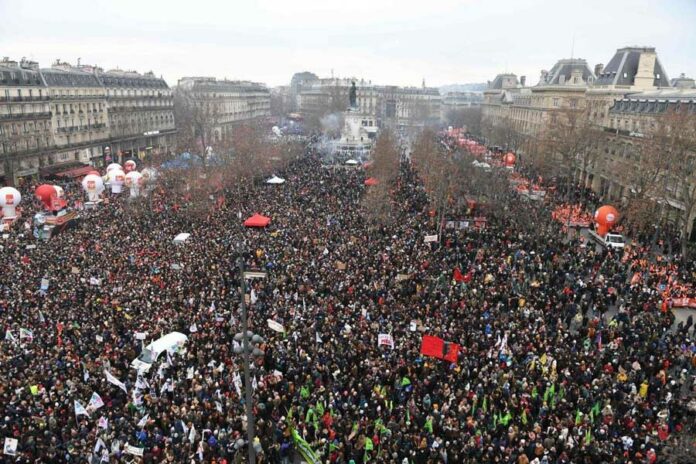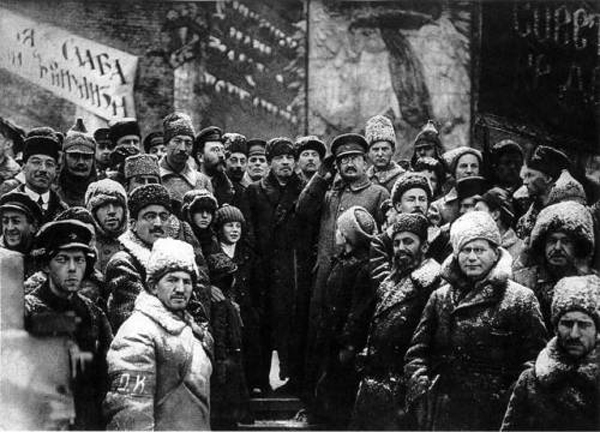Rafail Prasinos
A new round of struggles has been launched in France with a general strike on Thursday, January 19, in reaction to Macron’s attempt to pass a new anti-worker pension reform bill. French society has already been in turmoil, because of the rising inflation that is making basic goods and energy prices (electricity, fuel, heating) steadily increase; the changes introduced by the new pension bill represent a new offensive by the government.
What the bill provides for
The main point to which the majority of society is opposed is the increase of the retirement age from 62 to 64 years.
In an attempt to play down the protests, the government has announced that early retirement at the age of 62 would be allowed, however at reduced pay. This blackmail is not a viable option for workers: it not only does not provide for any increase in pensions to reflect the increasing cost of living, but is instead suggesting a reduced income. The Ministry of Labour estimates that these two provisions (the increase of the retirement age to 64 and reduced early pensions at 62) will contribute in saving 17.7 billion euros, balancing in this way and according to their reasoning, the system by 2027.
So, the government is attempting once again to make people pay for the economic crisis.
The trade unions argue though that the necessary funds can be raised by increasing taxes on the rich and employer contributions.

Big food companies, supermarket chains, technology companies and pharmaceutical multinationals have been making huge profits during the pandemic; the energy companies are profiting from the increases in energy prices; none of them have suffered any increase in taxation.
The pension system has been targeted many times in the past by French governments, as it’s among the most beneficial ones for workers in the European Union.
Powerful social reactions and consecutive multi-day strikes organised by the labour movement forced previous governments to back down. This is the reason why the current pension system is still in place. Last time we saw this happen was two years ago.
Large participation in the strike
The response of the people to the nationwide strike is estimated to have exceeded in some sectors the participation in the last mass strike wave two years ago. The highest participation rates were recorded in the energy, transport and education sectors, followed by workers in hospitals, government services, television and radio.
- Engie, the leading supplier of gas and electricity in France, announced that 40% of its workforce was on strike, although its employees are not subject to the general pension scheme.
- At EDF, the French state-owned electricity company, and Enidis, the operator of the public electricity distribution network, the CGT union registered a 57% and 66% participation respectively. The day before, the union had even threatened to cut off power for MPs and billionaires.
- The gas supply and distribution companies GRDF and GRTgaz recorded a participation rate of more than 40% and 50% respectively.
- According to the CGT union, the strike reached 70% to 100% participation at the various TotalEnergies refineries.
Public transport circulation was very limited, especially on the rail network: there were almost no local or regional services and the international high-speed trains (TGV, Thalys) were faced with important disruptions. The French rail operator SNCF reported that more than 75% of passenger trains were out of service. At Paris Orly airport, 20% of flights were cancelled and there were numerous delays.
In the education sector, the participation was very high with the FSU union announcing that 70% of primary school teachers and 65% of secondary education teachers were on strike. Many school pupils and university students also took part in the demonstrations, expressing their concern for their parents and their future employment conditions.
Official police figures count a total number of demonstrators at 1.12 million, while the trade unions state that over 2 million people took part in the protests. In Paris alone, over 400.000 people gathered, while the demonstration in Marseille was unprecedented, with 145.000 people taking part in it. In 200 small and large cities, demonstrations of between 20,000 and 50,000 people were organised.

Macron insists, the ruling class is expressing concerns
Despite the mass demonstrations and the rejection of the bill by the majority of society, French President Emmanuel Macron described the reform plan as “fair and responsible” in a statement on Thursday, January 19, therefore sticking to his initial position. He also pledged to go on “with respect, a spirit of dialogue, but also determination and responsibility”; moreover, on Monday, January 23, the French cabinet gave the green light for the plan to be submitted to parliament for a vote.
However, as Macron’s government alliance is very fragile, this will also be a test for the coming period, as he is obliged to negotiate each bill individually. Macron is counting on a support vote from the traditional centre-right party, the Republicans, so as to achieve the necessary majority. Otherwise, it is not excluded that he will use his constitutional right to legislate on his own.
But the capitalists are expressing their concern about the developments around the mobilisations; this is reflected in a statement by Patrick Pouyanné, Total Energies CEO, to Reuters the night before the strike:
“One day of strikes and protests… will not disrupt refinery operations, but this could change if the strikes were to last”.
The French ruling class is familiar with the determined resistance of the labour movement and the historic strikes it has organised specifically on this issue, therefore these concerns are justified.

France is showing the way!
The 8 unions that called the strike of January 19 are determined to continue the fight against the bill and have already announced a new nationwide strike on January 31. Mobilisations were also held on Saturday, January 21, in which hundreds of thousands participated.
The French workers’ movement has already proven in the past its strength and resilience. Given the constant deterioration of living standards, the popular strata are conscious that they have no choice but to defend what they have won in past battles. Interviews in Le Monde and other newspapers are very telling: several people state that, even though they have not been on strike for years, the situation now demands it. Common calls of the trade unions and repeated strikes with a democratically discussed plan for escalation, with the participation of more and more sectors of the economy, is the only way for the government’s plans to be overturned. At the same time, there seems to be a growing mood for struggle in a number of European countries (the teachers strike in Portugal, the general strike in Greece, the mobilisation for the health sector in Spain, etc), with the UK working class spearheading it. All of the above demonstrates that the need to coordinate struggles on a European level is becoming increasingly evident.













